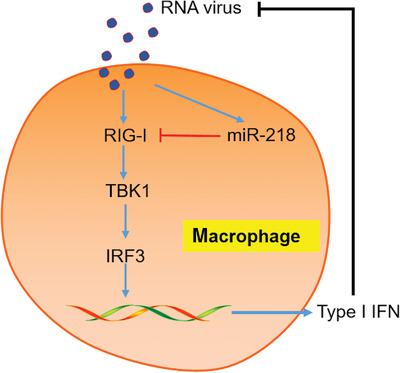当前位置:
X-MOL 学术
›
Biotechnol. Appl. Bioc.
›
论文详情
Our official English website, www.x-mol.net, welcomes your
feedback! (Note: you will need to create a separate account there.)
MicroRNA-218 inhibits type I interferon production and facilitates virus immune evasion via targeting RIG-I.
Biotechnology and Applied Biochemistry ( IF 3.2 ) Pub Date : 2020-01-07 , DOI: 10.1002/bab.1882 Yongle Qiu 1 , Xixue Geng 2 , Jiandong Ban 3 , Yuanhang Liu 4
Biotechnology and Applied Biochemistry ( IF 3.2 ) Pub Date : 2020-01-07 , DOI: 10.1002/bab.1882 Yongle Qiu 1 , Xixue Geng 2 , Jiandong Ban 3 , Yuanhang Liu 4
Affiliation

|
The host protective immunity against viral infection requires the effective detection of viral antigens and the subsequent production of type I interferons (IFNs) by host immune cells. Retinoic acid‐inducible gene I (RIG‐I) is the crucial signaling element responsible for sensing viral RNA component and initiating the downstream antiviral signaling pathways, leading to the production of type I IFNs. In this work, we identified microRNA‐218 (miR‐218) as a new virus‐induced miRNA that dampens the expression of RIG‐I in mouse and human macrophages, leading to the impaired production of type I IFNs. Interfering miR‐218 expression rescued RIG‐I‐mediated antiviral signaling and thus protected macrophages from viral infection. Hence, our results provide new understanding of miRNA‐mediated viral immune evasion and may be potentially useful for the treatment of viral infection in the future.
中文翻译:

MicroRNA-218通过靶向RIG-I抑制I型干扰素产生并促进病毒免疫逃逸。
宿主对病毒感染的保护性免疫要求有效检测病毒抗原并随后由宿主免疫细胞产生I型干扰素(IFN)。维甲酸诱导基因I(RIG-I)是至关重要的信号传导元件,负责感测病毒RNA成分并启动下游抗病毒信号传导途径,从而导致产生I型干扰素。在这项工作中,我们确定了microRNA‐218(miR‐218)是一种新的病毒诱导的miRNA,可抑制RIG-1在小鼠和人类巨噬细胞中的表达,从而导致I型IFN的产生受损。干扰miR-218的表达可以挽救RIG-I介导的抗病毒信号,从而保护巨噬细胞免受病毒感染。因此,
更新日期:2020-01-07
中文翻译:

MicroRNA-218通过靶向RIG-I抑制I型干扰素产生并促进病毒免疫逃逸。
宿主对病毒感染的保护性免疫要求有效检测病毒抗原并随后由宿主免疫细胞产生I型干扰素(IFN)。维甲酸诱导基因I(RIG-I)是至关重要的信号传导元件,负责感测病毒RNA成分并启动下游抗病毒信号传导途径,从而导致产生I型干扰素。在这项工作中,我们确定了microRNA‐218(miR‐218)是一种新的病毒诱导的miRNA,可抑制RIG-1在小鼠和人类巨噬细胞中的表达,从而导致I型IFN的产生受损。干扰miR-218的表达可以挽救RIG-I介导的抗病毒信号,从而保护巨噬细胞免受病毒感染。因此,











































 京公网安备 11010802027423号
京公网安备 11010802027423号